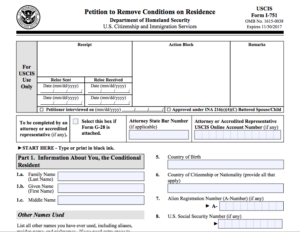Conditional Permanent Residence and How to Remove the Conditions
A conditional permanent resident receives a green card valid for 2 years. In order to remain a permanent resident, a conditional permanent resident must file a petition to remove the condition during the 90 days before the card expires. The conditional card cannot be renewed. The conditions must be removed or you will lose your permanent resident status.
To remove the conditions on a green card based on marriage, you must file Form I-751,Petition to Remove the Conditions of Residence.
1.What Is the Purpose of Form I-751?
This petition is used by a conditional resident who obtained status through marriage, to request that U.S. Citizenship and Immigration Services (USCIS) remove the conditions on his or her residence.
2. Who May File Form I-751?
If you were granted conditional resident status through marriage to a U.S. citizen or lawful permanent resident, use Form I-751, Petition to Remove Conditions on Residence, to file for the removal of those conditions.
If you have dependent children who acquired conditional resident status on the same day as you or within 90 days thereafter, then include the names and Alien Registration Numbers (A-Numbers) of these children in Part 5. of Form I-751 in order to request that the conditions on their status be removed as well.
If you have dependent children who did not acquire conditional resident status on the same day as you or within 90 days thereafter, or if the conditional resident parent is deceased, then those dependent children must each file Form I-751 separately to have the conditions on their status removed.
If you are still married, then file Form I-751 jointly with your spouse through whom you obtained conditional status. However, you may file Form I-751 without your spouse if:
- You entered the marriage in good faith, but your spouse subsequently died;
- You entered the marriage in good faith, but the marriage was later terminated due to divorce or annulment;
- You entered the marriage in good faith, but you have been battered or subject to extreme cruelty by your petitioning spouse; or
- Your conditional resident parent entered the marriage in good faith, but you have been battered or subject to extreme cruelty by your parent’s U.S. citizen or lawful permanent resident spouse or by your conditional resident parent; or
- The termination of your status and removal from the United States would result in extreme hardship.
3. How to Fill Out Form I-751. Please find the sections information listed in Form I-751 requested in Part1-11 as below.
(Form I-751)

Part 1. Information About You, the Conditional Resident
Part 2. Biographic Information
Part 3. Basis for Petition
Part 4. Information About the U.S. Citizen or Lawful Permanent Resident Spouse.
Part 5. Information About Your Children
Part 6. Accommodations for Individuals With Disabilities and/or Impairments
Part 7. Petitioner’s Statement, Contact Information, Acknowledgement of Appointment at USCIS Application Support Center, Certification, and Signature
Part 8. Spouse’s or Individual Listed in Part 4.’s Statement, Contact Information, Acknowledgement of Appointment USCIS Application Support Center, Certification, and Signature
Part 9. Interpreter’s Contact Information, Certification, and Signature
Part 10. Contact Information, Statement, Certification, and Signature of the Person Preparing this Petition, If Other Than the Petitioner
Part 11. Additional Information
4. At the time of filing, you must also submit “Initial Evidence”.
- Permanent Resident Card
- Evidence of the Relationship
- Relevant required proof of the situation as below: If you are filing as an individual due to the death of your spouse / your marriage has been terminated/ You and or your conditional resident child were battered or subjected to extreme cruelty/ “extreme hardship”
- Criminal History
Reference: https://www.uscis.gov/
Disclaimer: The Contents of this web site is for informational purposes and should not be considered legal advice. This web page may be considered advertising under Massachusetts Supreme Judicial Court Rules, and it does not establish an attorney-client relationship
We invite you to contact us and welcome your calls, letters and electronic mail. Contacting us does not create an attorney-client relationship. Legal advice and representation can only be obtained upon retaining our firm and the execution of a written agreement for the rendering of specific legal services. Augen Law Offices value your privacy and respect the attorney-client privilege
Augen Law Offices
Address: 21 McGrath Hwy, Suite 205, and Quincy, MA 02169
Email: [email protected]
Tel: 857-526-6042
Wechat ID: augenlawyers


